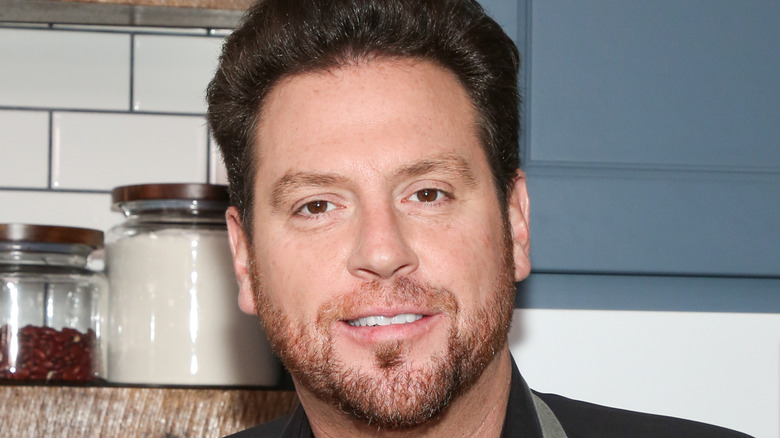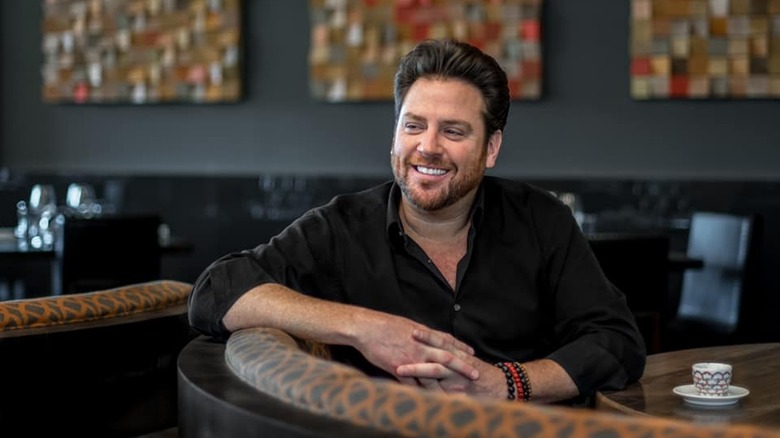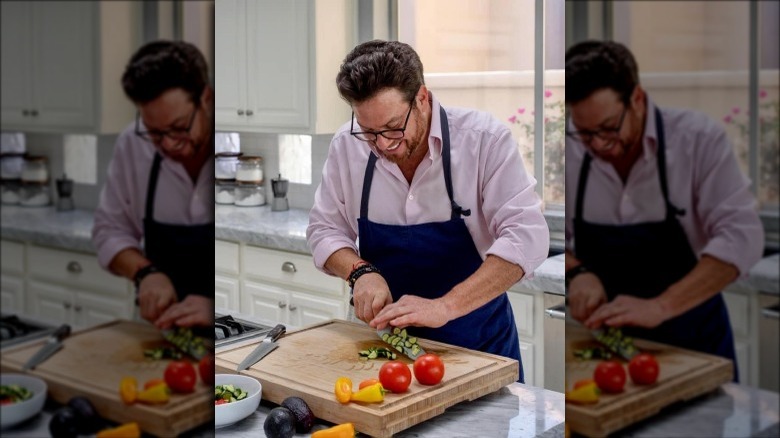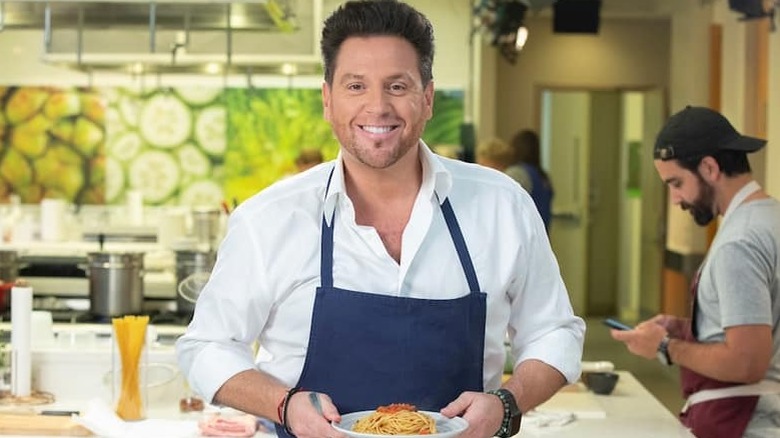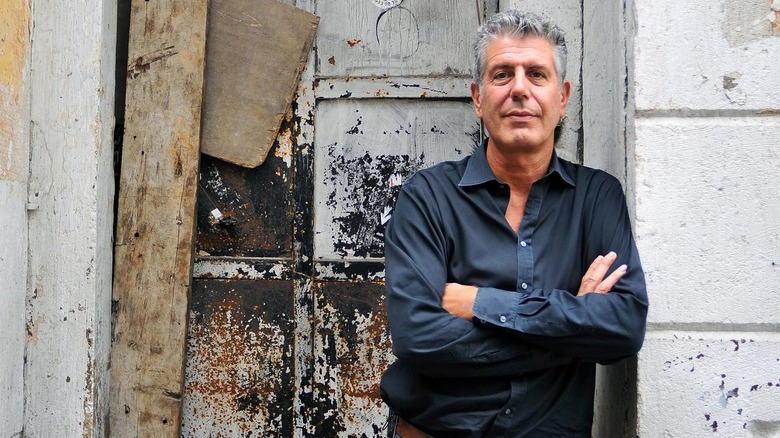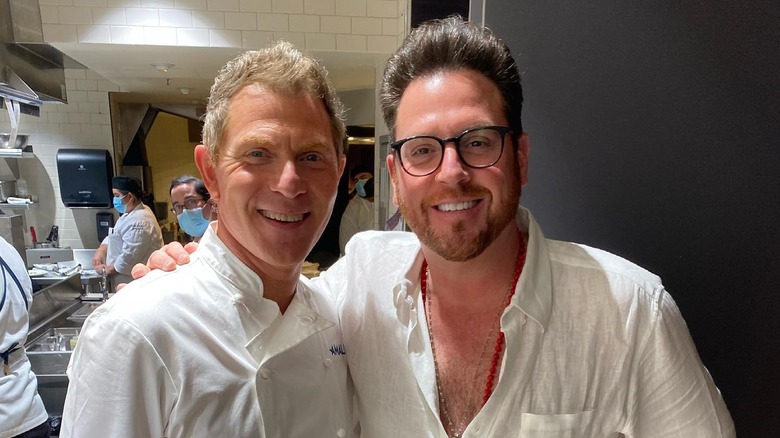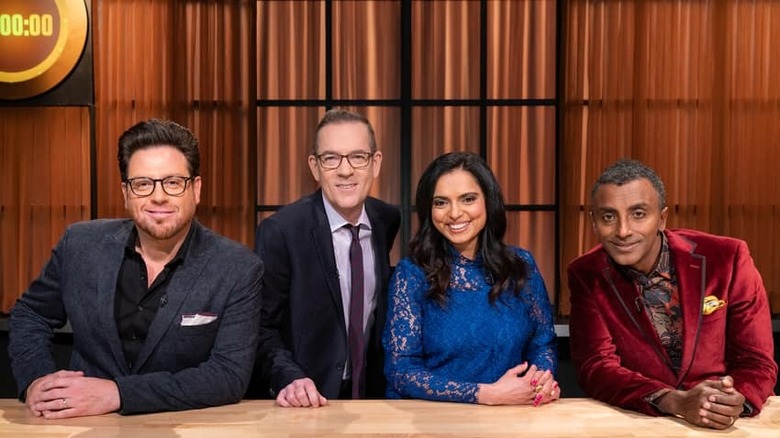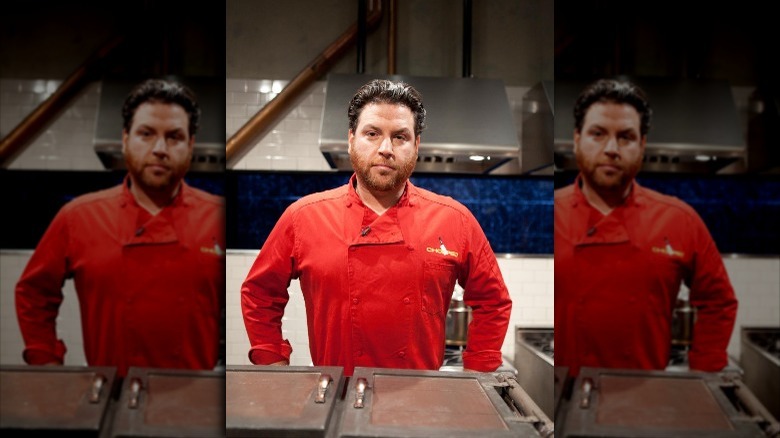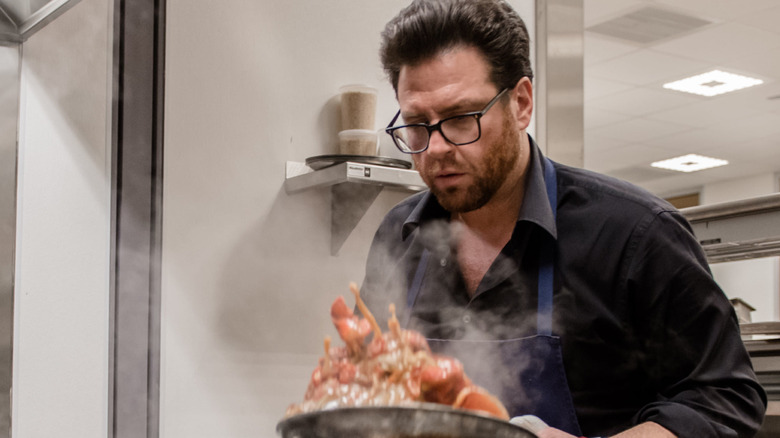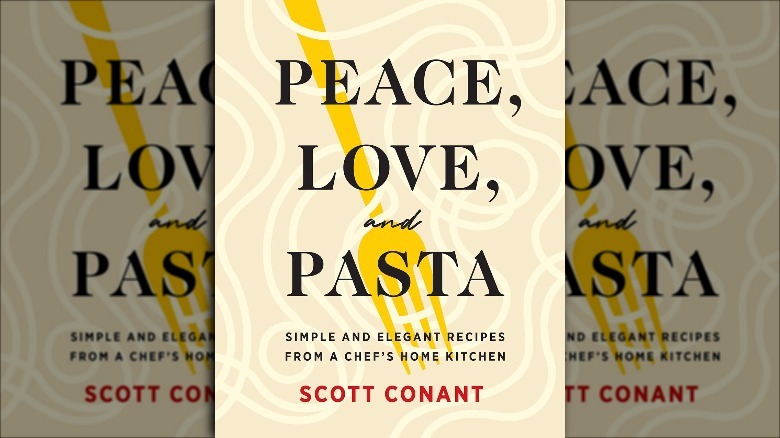Chef Scott Conant Dishes On Italian Food And Chopped - Exclusive Interview
We may receive a commission on purchases made from links.
You may be familiar with Scott Conant from his storied stints in the kitchens of New York restaurant sensations L'Impero, Alto, and Scarpetta, which earned him a slew of accolades including glowing reviews from The New York Times, a best new chef shout out from Food & Wine, and multiple James Beard awards. Or perhaps you're a fan of the celebrity chef from his multitude of television appearances, most notably as the straight-talking, raw onion-hating judge on "Chopped."
But with his hot-off-the-presses cookbook "Peace, Love, and Pasta," Conant shares his experience in the home kitchen, offering a wide range of mouth-watering recipes, many of which are inspired by the moments spent cooking for as well as alongside his family during the pandemic. While "simple" may be a running theme of the book, don't expect anything boring whether he's showcasing his Italian prowess, offering his spin on American favorites, or exploring his wife Mel's culinary roots with an entire chapter devoted to Turkish cuisine.
During an exclusive interview with Mashed, Conant reflected on his remarkable 35-year cooking career offering insight into his multiple food facets, reflecting on his remarkable career as a chef and restaurateur, how he became a Food Network fixture, and the inspiration behind "Peace, Love, and Pasta."
How Scott Conant almost became a hairdresser
Before we talk about food, you mention in the book that if you didn't pursue cooking you might have ended up as a plumber or a hairdresser. How seriously did you consider those career paths?
Well, so when you go to a vocational school like I did for high school, you have to make choices. So the first choice that I made was plumbing, and I couldn't get into that program because too many people had applied. And the second choice was culinary arts. And then the third choice was hairdressing. So I had a feeling, no matter what, I was going to get into culinary. It was actually, it was funny because the way it worked was you have to try all those other kinds of vocations and trades. And other than gym, the only class I had gotten an A in was culinary arts. So I figured I would be okay as a second choice.
It was your destiny.
Yeah, exactly. But I did start working simultaneously at a family friend's restaurant. So that kind of helped with the culinary pursuit, I would say.
Why Scott Conant is obsessed with Turkish cuisine
Your wife is from Turkey and you devote a chapter in the book to Turkish recipes. What are some of the ingredients and techniques in Turkish cuisine that particularly resonate with you?
Well, I mean, there's so much yogurt you would lose your mind. What a great natural probiotic, so it's a great way to stay healthy. But there's a lot of things that, it's just that Mediterranean air, those Mediterranean ingredients, from cucumbers and grape tomatoes, as I said to yogurt, to some delicious spices like sumac and Aleppo pepper and pul biber, which is this delicious Turkish dried pepper. So there's a lot of really great ingredients. And I just think that the approach to food overall is similar to all things Italian, because it's just so soulful and heartfelt, right?
When it comes to Italian cooking, for a lot of Americans the focus is simply pizza, pasta, Parmesan. What are some traditional dishes that deserve more attention stateside?
Well, I think the one thing is there's a big difference between Italian and American. That's an important differentiator for me when it comes to talking about all things Italian. And I think that when it comes to Italian food, that expectation of these giant portions and meatballs the size of your fist, all that stuff is not Italian at all, it's Italian American. And that's okay, but I think it's important to be able to identify and discuss the difference and if someone goes to Italy, just to know not to expect that. You're going to get some delicious food, and there may be hints and nuances that are kind of similar to that idea, but the cuisine changed dramatically, as you know, when a lot of Italians started coming to the U.S. and those same ingredients just weren't available.
The biggest mistakes people make when cooking pasta, according to Scott Conant
What are some of the fundamental mistakes that people in the U.S. tend to make when cooking pasta?
Well, there's a few of them and I get a lot of grief for talking about this, particularly grabbing spaghetti and breaking it in half. There's an integrity to pasta. And people think I'm crazy when I say this, but having worked with Italians for years, I think there's a lot of reverence that goes into the food. And there's a deep understanding that Italians will sit at a restaurant and argue with the waiter to make sure that, is that chicken, is it free-range? Is it ruspante? What's the pasta like? What kind of flour was it made with? They have this intimate knowledge of food and no one gets offended by those things in Italy, by those crazy conversations that Italians have with servers.
Whereas here, I'd be like, "Just shut up and eat." You know? If someone's going to ask me those questions and come to my house for dinner, I would say, "What are you talking about? Just shut up, sit down and eat and enjoy yourself." But I think it's that reverence and it's that integrity that Italians are all about. And I wanted to bring some of that. I'm not crazy. I'm not out in left field someplace. I just think that there's some attention that's necessary and a reason why we do what we do.
As far as breaking the pasta in half, why is that a no-no?
Because the pasta has integrity, right? And, and that length is there for a reason, right? How you pick up the pasta is by twirling your fork. I think there's a couple other things that people do. They forget to salt their water. I think that sometimes people take the pasta out of the water, put it on a platter and put the sauce on top, which is challenging also, just because of the amount of liquid that kind of pools up on the bottom of the platter. Things like that. Again, it all boils down to being a little bit more thoughtful and just kind of that reverence for the product itself.
Can you expand a little on the importance of salting the water?
Yeah. Well, that salt, I always say that when you salt the water, a lot of people say it should taste like the ocean. I think it depends on which ocean you're talking about. But at the end of the day, if it's tremendous, that could be too much salt. Because what happens with pasta is you're putting the pasta inside that salted water, there's that transfer of flavor and it helps season the pasta, clearly. I like to utilize that pasta cooking liquid, that pasta water, inside the sauces when I'm sautéing the pasta afterwards. So if it's too salty, it's going to reduce with that sauce and then make your dish overall too salty. So I like to season it so it tastes like a really good neutral broth. And if you season it the right way and you taste it and it has almost a broth-like saline content, that way you could utilize it for the sauces that you're cooking as well.
How Scott Conant ended up on No Reservations
Is there a pasta recipe in the book that's a particular favorite of yours?
Oh, it's hard to say. There's so many things. There's a spaghetti aglio e olio, which I love. There's a pasta Pomodoro, which I've been making for years. It's one of my signatures that I've done in restaurants over the past 25 years or so. I mean, the list goes on and on. There's a fusilli with chicken livers that ... I wanted to put it out in there. I know a lot of people don't eat chicken livers like they used to anymore, but it's special. It's spicy, it has depth. There's a little bit of like an Italian fish sauce inside of it to really add some umami to it overall. The texture of the fusilli pasta is wonderful. There's a lot of good stuff inside that dish.
You mentioned the pasta Pomodoro. I appreciated that you included that recipe right at the top of the pasta chapter. It's basically your "Stairway to Heaven," and you opened with your biggest hit. When you came up with the recipe did you have any idea that it would end up being your culinary calling card?
You know, no. I mean, that's a variation of something I used to do years ago at different restaurants. And when I started cooking it initially, I did some things, I tried baby tomatoes in it, I tried to personalize it with a few other things here and there. And ultimately, I just settled with this kind of traditional sauce. And it's made a lot of people happy. Yeah. Sometimes you stumble into luck and just take it from there.
You prepared the dish on the Techniques episode of "No Reservations." Do you recall how you got involved with the show? Did you know Anthony Bourdain from your New York chef days?
Yeah, I had known Anthony for years. He came in for dinner with his wife at the time [Ottavia Busia-Bourdain], years ago and she's Italian, but she was giving me a little bit of grief. And I said, "Listen, just sit down and let me cook for you." And there was this moment where she was talking to me and I said, "Your accent sounds like you're from Bergamo or outside of Milan someplace." And she was shocked that I had gotten it just by the accent. So they sat down and had dinner. And like I said, I'd known Tony for years. And I was happy and excited that they were there. And of course, the whole restaurant was abuzz because Anthony Bourdain was there. And then I got a phone call a few months later that they were doing a technique episode and that pasta cooking, in general, was important to that episode. So I was flattered.
Scott Conant discusses his friendship with Bobby Flay
You had a string of hit restaurants in New York. How did your career detour into television?
I got a phone call one day and I thought doing all these restaurants and kind of being a New York centric chef, television is a great advertising platform for future growth or just people knowing who I am. I figured if they see me on TV and then they see that I have a restaurant in their city or a close city to them or a city that they're visiting, there's a good possibility that they could visit. So that was the mindset. That's how it all started.
Was it a natural fit or was there a learning curve? Did you have any mentors who sort of guided you on how to transition to television?
You know, I don't know if there was a learning curve. I feel like I've gotten more comfortable with it over time and probably less aware that there's a camera there. And just try to get and articulate a thought well, and be able to get it across and communicate it well. That was my intention. That's still my intention. That's still what my goal is when, whether it's this or on set someplace or on a TV set. So, as far as mentors, I would listen to producers and what the feedback has been or what it was, or what it continues to be. And I try to be super easygoing. I try to listen and I try to learn. And feel like it's really important in a conversation that you can impart your own wisdom, but also learn simultaneously. And whether or not that shows in the edit, I'm not sure. But I've learned, just like in a restaurant, once you put the food in the window, it's really not up to you anymore. So, on a TV show, I put it out there, the edit is the edit.
You've been a judge on so many shows. Is there one, in particular, you enjoy doing most?
I can only speak to the reaction that people have. "Chopped" has been going on for 13 years now. It is a true blessing that we've been able to shoot this show that long. I don't think any of us saw that coming in the initial days of doing it. But I would say the best feedback that I get is when I do "Beat Bobby Flay." First of all, it's always fun to hang out with Bobby. I mean, he's a wizard. But second of all, I feel like they show a little bit more of my personality instead of just kind of commenting on dishes. So it's fun to make fun of Bobby. It's fun to be with the guest hosts that are there. And the feedback on that is pretty positive.
Do you and Bobby ever hang out after the show?
We have hung out many times. We've done a few photoshoots together. We've done a few shows together. And honestly, Bobby's the guy who, if there's something going on in my life or career, Bobby's there. If I can pick up the phone and just give him a call and ask him some questions and say, "When you were doing this, what was it like?" And the wild thing about Bobby is he is the most decisive person I've ever met in my life. And it just makes for great business acumen. He just makes really sound decisions because he is so incredibly insightful and decisive.
What Scott Conant enjoys most about Chopped
As far as "Chopped," how did you get involved with that specifically? And do you remember your reaction when you first heard the concept of the show?
Well, I remember the phone call that I got and somebody sent me an email. They called me, sent me an email and they're like here's the show. And I remember seeing the pilot that they had shot. I had opportunities with television in the past that I had passed up. And so, as I said, that advertising platform is a big deal. It's not about the money. It's about the advertising platform to be able to grow your, I hate the term, but to grow your "brand." So I thought of it strictly as a business opportunity. I still, to this day, it's a business opportunity. It's not about me seeing myself on television or assuming that I'm famous when I walk in a room. None of that stuff is important to me. What's important to me is that you start a business, you have a sound business and you build the business. And what are the tools that you need to build that business? And I feel like television is one of the tools. If you can have that in your toolbox, in your arsenal, I think it's an important thing to have.
The show is approaching season 50 and you've appeared on over 200 episodes. Do you have any highlights working on "Chopped"?
There's some people that I've met doing that show, on both sides of the table, judges and chefs, that I have lifelong friendships with now. People who are close to me. I mean, I was texting Alex Guarnaschelli yesterday. Alex is one of my closest friends. I think people can't wrap their heads around that sometimes because they just see us working together. But Alex and I have known each other for 20-something years.
But I met Amanda [Freitag] while we were shooting. I think it was like our second or third time shooting that we were working together, and we're super close friends as well. So I feel like, you know when you go through your phone and it shows these faces and you have your family and all that kind of stuff? I have all these pictures of all the judges and Ted [Allen] and producers and all these people inside my phone. And it really, it dawned on me one day, that we really truly are a family. They're there in my family photos. It's wild, you know?
Why Scott Conant hates competing
You actually won on "Chopped All-Stars" Season 3. Why did it take so long for you to compete and what was that experience like?
I hate competing. And I don't use that word very often. I have daughters, young daughters, and we don't say the "hate" word in the house. I really, really hate competing. It's not the way I cook. First of all, I don't like competition because I am overly competitive and I lose my sense of self and I don't have fun. And I feel like because I'm not having fun, I don't want to do it. I don't want to do anything that I don't enjoy. I'm a big believer that you should just kind of pursue your, to quote Joseph Campbell, to pursue your bliss. And I'm a big believer in that. So, yeah, I don't like it. I wouldn't have done it if they didn't kind of force me to.
Even Aaron Sanchez pulled me aside one day and he was like, "Listen, man, I got talk to you." Like, "What's up?" He's like, "You got to compete." And I'm like, "No, I don't want to. I don't want to do it." And he was like, "No, you got to." So when it got to a certain point where they started to turn to the other judges to get me to compete, I knew that my resolve was lessened.
Scott Conant discusses his restaurant empire
Before your TV days, the restaurant that really put you on the map was L'Impero in New York. Do you remember the day you got the three-star review for the restaurant from Eric Asimov at The New York Times and what that meant to you?
Of course, I remember. It was everything that I'd ever worked towards to that point in my career. And it was wild because it was such a great restaurant. I remember Ruth Reichl walking in one day, she was the editor in chief of Gourmet at the time, she'd walked into the restaurant and she just stood there looking around. And she just said out loud, "This restaurant is so adult." And I just felt really honored that she would recognize that and I just had the utmost respect for Ruth. And she gave me my first review in The New York Times when I was 26, 27, something like that. And Eric Asimov, he had come in a few times, and I was a nervous wreck cooking for them. As I said, I was young, I was 30, and it was a pretty big opening and it was a culmination of my career until that point. So it was really important to me. And I haven't read that review in years. I should probably look back at it.
Looking back, what do you miss most about being in the kitchen and having that lifestyle?
I don't miss it, at all. I mean, I feel like it's a young person's game. When I go into the restaurants these days, I wonder how did I do this for so many years? I mean, I still jump on the line and I still help the team out, but I'm not working a station, I'll tell you that much. God knows that that wouldn't bode well.
You followed L'Impero with Alto, and then Scarpetta was obviously a massive sensation. What restaurants are you currently involved with?
I have a restaurant called The Americano here in Scottsdale. I have another restaurant called Mora Italian here in Phoenix, and I have a couple other ones. I have one in the Catskills called Cellaio, which is a steakhouse as well. And I'm looking at other markets. I'm negotiating things. And there's nothing unfortunately that I could talk about right now. But I do feel like both Mora and The Americano have the same legs that something like a Scarpetta would have at the time. I mean, a little fresher, a little updated, things of that nature.
What inspired Scott Conant to write Peace, Love, and Pasta
Going back to "Peace, Love, and Pasta," what was the inspiration behind the book and what do you hope readers take away from it?
Well, I've been cooking for 35 years now, and that's a long time. I don't realize that it's that long, but it's a long time. And I feel like the books that I've done in the past were based on the food that I was cooking at the time, but I never really cooked at home because I was always in restaurants. So it wasn't until really the pandemic that I started cooking a lot for the family. Where I was cooking two, three meals a day. And at the same time working on this book, it kind of dawned on me that there's this evolution of life. And this is my evolution. Where I started, I was a restaurant kid and working through restaurants, working a hundred hours a week, living and breathing restaurants and restaurant life.
And then I have a family and it's changed. And there's a certain peace and love and internal evolution that happens from that. And I wanted that to be entrenched in this book. I wanted people to feel that if you bought my first book, second, or third book, and then you see this, there is an evolution that's happened with me. I feel like the recipes in "Peace, Love, and Pasta" are very approachable and simple, but they still get the result of what you would expect from a chef, which is big, assertive flavors and little twists that are chefy and fun. So I want it to be both interesting and familiar simultaneously. And I feel like we found that balance.
You can catch Scott Conant on new episodes of "Chopped" and try your hand at some of his favorite recipes by picking up his new book "Peace, Love, and Pasta."
